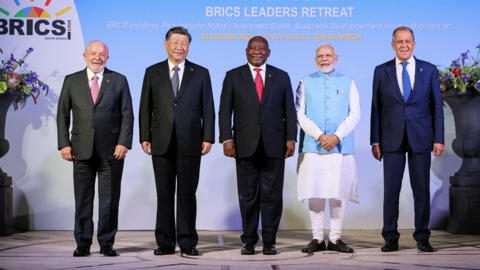Driving Cooperation and Global Development. The meeting of the BRICS countries in Johannesburg in August 2023 is posing a different political reality in a new global scenario. In a world that is constantly evolving, international cooperation has become a fundamental pillar for addressing global challenges. In this context, the group known as BRICS has emerged as an influential force, redefining geopolitical and economic dynamics. The acronym BRICS represents five key nations: Brazil, Russia, India, China, and South Africa, with others gradually joining, such as the Argentine Republic, the Arab Republic of Egypt, the Federal Democratic Republic of Ethiopia, the Islamic Republic of Iran, the Kingdom of Saudi Arabia, and the United Arab Emirates. Despite their differences in culture, history, and political systems, these countries have joined forces in pursuit of sustainable development and a more active role on the international stage.

Origins and Evolution
The term “BRIC” was coined by economist Jim O’Neill in 2001 to highlight the growing economic power of Brazil, Russia, India, and China in the world. Subsequently, in 2006, South Africa joined the group, turning it into BRICS. Since then, this alliance has become an important forum for cooperation, addressing issues ranging from the economy to global security.
Objectives and Areas of Cooperation
The primary objective of BRICS is to promote cooperation in key areas for the development and well-being of its member nations and, ultimately, the entire world. Some areas of cooperation include:
- Economy and Trade: BRICS countries represent a significant proportion of the world’s GDP and international trade. As a result, they have sought to strengthen economic cooperation, promote intra-BRICS trade, and address global financial issues.
- Sustainable Development: Commitment to sustainable development is a fundamental feature of BRICS cooperation. Members work together to address environmental challenges, promote clean energy sources, and advance inclusive economic growth.
- Innovation and Technology: BRICS recognizes the importance of innovation and technology for future development. Collaboration in research and technological development is a vital aspect of their agenda.
- Global Governance: BRICS countries seek to reform international financial institutions to make them more inclusive and representative of the new global economic reality, which could have a significant impact on global governance.
- Security and Peace: BRICS also addresses security and peace issues, working together to resolve regional conflicts and promote global stability.
Challenges and Opportunities
Despite its achievements, BRICS also faces challenges that need to be addressed to ensure its ongoing success:
- Diversity and Differences: BRICS members are diverse in terms of economic size, culture, and political systems. Handling these differences constructively is a constant challenge.
- Coordination: Coordinating among five nations with sometimes divergent interests can be complicated. Cohesion and effective decision-making are essential.
- Continuous Relevance: As BRICS members evolve and develop, they must ensure that the group remains relevant in a constantly changing global landscape.
- Global Challenges: As the world faces challenges like climate change, poverty, and security, BRICS has the opportunity to contribute to effective solutions.
The Future of BRICS
The future of BRICS is brimming with possibilities. As their economies continue to grow and their ties strengthen, they are likely to play an even more prominent role in shaping the global order. Through cooperation and collaboration, BRICS has the potential to influence global decision-making and contribute to sustainable development worldwide.
In conclusion, BRICS is an example of how cooperation among diverse nations can generate a positive impact on the global stage. Through economic collaboration, a focus on sustainability, and the promotion of more equitable global governance, BRICS is paving the way toward a more cooperative and resilient world. Its future evolution will be crucial in determining its ongoing contribution to the ever-changing global landscape. The economic and political changes worldwide sometimes require long periods of time to show who the new hegemonic countries are and who ceases to be so. However, it seems that the change has already begun. We are beginning to see it.